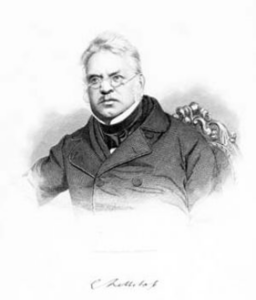In a distant place
(Poet's title: In der Ferne)
Set by Schubert:
D 957/6
[August 1828]
Part of 13 Lieder nach Gedichten von Rellstab und Heine (“Schwanengesang”), D 957
Wehe dem Fliehenden,
Welt hinaus Ziehenden! –
Fremde Durchmessenden,
Heimat Vergessenden,
Mutterhaus Hassenden,
Freunde Verlassenden
Folget kein Segen, ach,
Auf ihren Wegen nach!
Herze! das sehnende,
Auge, das tränende,
Sehnsucht, nie endende,
Heimwärts sich wendende,
Busen, der wallende,
Klage, verhallende,
Abendstern, blinkender,
Hoffnungslos sinkender.
Lüfte, ihr säuselnden,
Wellen sanft kräuselnden,
Sonnenstrahl, eilender,
Nirgend verweilender:
Die mir mit Schmerze, ach!
Dies treue Herze brach,
Grüßt von dem Fliehenden,
Welt hinaus ziehenden.
Woe to the person fleeing,
Setting off into the world!
The person striding amongst strangers,
Forgetting home,
Hating his mother’s house,
Leaving his friends behind.
Alas, no blessing follows such a person
As he goes on his way!
Longing heart,
Weeping eyes,
Never ending longing
Turning back towards home!
Seething breast,
Fading lament,
Twinkling evening star,
Sinking into despair!
You rustling breezes,
Gently rippling waves,
Hurrying sunbeams,
Never settling to rest:
To her who with pain, alas,
Broke this faithful heart –
Pass on greetings from the person fleeing,
Setting off into the world!
All translations into English that appear on this website, unless otherwise stated, are by Malcolm Wren. You are free to use them on condition that you acknowledge Malcolm Wren as the translator and schubertsong.uk as the source. Unless otherwise stated, the comments and essays that appear after the texts and translations are by Malcolm Wren and are © Copyright.
☙
Themes and images in this text:
Chest / breast Eyes Fleeing Friends Greetings Hearts Hesperus, the evening star (Venus) Home (Heimat) Hope Laments, elegies and mourning Longing and yearning Near and far Pain Rays of light Tears and crying Waves – Welle Wind
It takes some time for the reader to work out who is who and where we are in this rather strange text. It seems to begin as a denunciation of someone who has run away (from home, obligations and common sense) but eventually it emerges that the speaker is referring to himself. It was not an accusation but a lament. And what are we to make of the repeated participles, the piled up phrases which never seem to resolve or cohere into a meaningful sentence? It would be tempting to think that the poet is simply showing off, dazzling us with technical expertise, but that would only be the case if the resulting language made more sense. It is much more likely that it is the incoherence that is what matters: this is a speaker who is still in the midst of a disorientating experience for whom nothing has yet been resolved. He has not fled, he is a person still fleeing. The present participle points to the crucial point.
It takes the whole of the first strophe for the speaker to realise that his current situation is going to have implications, that the relationships that characterised his previous life will never be restored. He cannot expect anyone to give him their blessing. He sees himself as still in the process of leaving, of abandoning his friends, yet this very fact can only mean that he has already abandoned them. He is going to have to accept that he has burned his bridges.
The second strophe is where the ‘fugitive’ or ‘escapee’ finds himself most adrift. Participles struggle to be either nouns or verbs (or both at the same time), suggesting that the speaker is trying to make sense of the swirling thoughts that are now overwhelming him. In the end, there is no finite verb, no subject with a meaningful predicate. It is therefore more or less impossible to make any meaningful comment on the content other than to note that at the centre of the strophe is the word ‘wendende’ – turning. This central point of the whole text is where the speaker’s thoughts do clearly turn. He now realises that he is already ‘in der Ferne’, a long way away from home. His thoughts turn back homewards.
In the final strophe he is more articulate. The participles here relate to the external environment rather than to the inner life of the speaker himself. He asks the rustling breezes, the rippling waves and the scuttling sunbeams to carry a forlorn greeting back to the person who has caused all of his suffering. He seems to have realised at last what it means to be someone who is fleeing, who is setting off into the world. Although the final two lines of the poem echo the first two, the speaker has undergone a transformation and the meaning of the words has changed accordingly.
☙
Original Spelling In der Ferne Wehe dem Fliehenden Welt hinaus ziehenden! - Fremde durchmessenden, Heimath vergessenden, Mutterhaus hassenden, Freunde verlassenden Folget kein Segen, ach! Auf ihren Wegen nach! Herze, das sehnende, Auge, das thränende, Sehnsucht, nie endende, Heimwärts sich wendende! Busen, der wallende, Klage, verhallende, Abendstern, blinkender, Hoffnungslos sinkender! Lüfte, Ihr säuselnden, Wellen sanft kräuselnden, Sonnenstrahl, eilender, Nirgend verweilender: Die mir mit Schmerze, ach! Dies treue Herze brach, - Grüßt von dem Fliehenden, Welt hinaus ziehenden!
Confirmed by Peter Rastl with Gedichte von Ludwig Rellstab. Erstes Bändchen. Berlin, bei Friedrich Laue. 1827, pages 118-119.
To see an early edition of the text, go to page 118 [134/265] here: http://digital.ub.uni-duesseldorf.de/download/pdf/3376501


